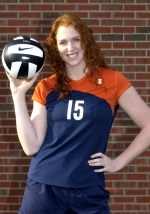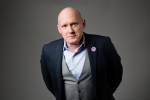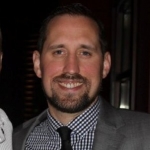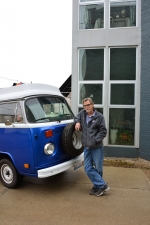What do Joey Ramone, the Talking Heads and Ted Kennedy have in common?
All played Foellinger Auditorium in future FleishmanHillard senior VP Bob Axelrod’s years on campus, which he chronicled for The News-Gazette’s UI-at-150 project in an essay titled “Foellinger Auditorium: My Orbital Axis.”
Here goes ...
“Eerily reminiscent of S.E. Hinton’s classic greasers vs socials divide, the clash of cultures on the U of I campus in the late 1970s and early ’80s pitted polo shirts draped with sweaters against black leather jackets and safety pin earrings. Though the brawl was largely ideological, my buddy who channeled Johnny Rotten did get ridiculed and roughed up fairly often.
“With the Me Generation essentially plateaued, a renewed sense of rebellion and activism was emerging. Angry mohawks and their less extreme new wave brethren represented the new guard, confronting the status quo in music, art, government and society, while the preppies and Greeks remained business as usual. With friends and a foot in both camps, I definitely resonated more with the agitators.
“The place where we could all convene to celebrate both our community and our diversity was Foellinger Auditorium. And, because music has always been central to my life, Foellinger was an axis of my orbit during those years. What follows are some of my best memories there.”
— Damage done. “When the Ramones stormed onto the scene doing the Blitzkrieg Bop in 1976, I was still buying Led Zeppelin records and desperately trying, but failing miserably, to embrace Yes, Emerson Lake and Palmer and other overwrought fare. For me, something had gone terribly awry in rock n roll. Then, in 1978, while visiting a friend in the Scott Hall dorms, I was hit with a raw yet impossibly melodious track rooted in rock’s rebellious origins while sounding completely fresh. ‘I Wanna Be Sedated’ by The Ramones exemplified the energetic nihilism that defined early punk and it was just the musical epiphany I needed.
“Joey Ramone and his crew practically invented punk rock and I was lucky enough to catch them in their prime at Foellinger Auditorium, on Friday, May 2, 1980. We winnowed our way through the crowd and commandeered the punk-rock equivalent of orchestra pit seats: a plywood platform, just a few feet from the stage, which supported mammoth speakers aimed at the band so they could hear themselves play. And as soon as Johnny Ramone hit his first power chord, my whole world goes off kilter. The blast from those jumbo woofers was just too much for my cochlea fluids to bear, and over I went. After I shook myself off I moved a little farther away, but the damage was done. That night, I traded a bit of my hearing for the mythical experience of getting up close and personal with one of the most iconic and influential acts to ever cut a record.”
— Through the bathroom window. “One Wednesday night in late October 1979, after having fully availed myself of the Green Street bar specials, I rounded Lincoln Hall and immediately sensed something brewing at the auditorium. The closer I got, the more familiar the asynchronous beat became. It was the Talking Heads touring on their third record, ‘Fear of Music.’
“In my midweek special state of mind, and in the spirit of the band, I decided to challenge convention and enter the packed show sans ticket. Surveying the perimeter for a weak link, I found a row of clear transom windows that, inexplicably, looped the top of the women’s subterranean restroom. I tapped the glass a few times, mostly being ignored, until a gracious young woman in full punk regalia climbed onto a sink to unlatch a window and enable me to shimmy my way into this memorable moment.
“Having arrived a bit late to the party, I caught the last song of the main set, a rousing version of ‘Psycho Killer.’ The band said their goodbyes and then the lighters — not cell phones — came out and illuminated the crowd’s demand for more. The Heads obliged with ‘Life During Wartime’ and my all-time favorite, their new wavy rendition of Al Green’s ‘Take Me to The River.’ Not a bad set list for a guy who happened to literally stumble upon the show. Sneaking into a concert just seemed the right thing to do when punk was young.”
— Head shake. “The carnival atmosphere outside Foellinger that day in early March 1980 was infectious. My friends and I were chilling in a line that snaked from the auditorium steps well past the middle of the Quad, waiting on royalty; not the rock ’n roll kind, but the crown prince of Camelot, or least the remnants of it. The Honorable Ted Kennedy was making a whistle stop during his Democratic primary bid against incumbent president, Jimmy Carter, and California Governor Moondog Brown.
“Under the Carter administration, the economy tanked, inflation soared and the Ayatollah Khomeini had single-handedly taken our country hostage. It was time for our own coup and we believed The Lion of the Senate to be the change we wanted to see in the world. Sure, there was Chappaquiddick and all, but he was a Kennedy. Yes, revolution was in the air and it was reflected in the music we were listened to and the clothes we wore. One fashion statement that really stands out for me from that day was a guy wearing tinted glasses with a shattered right lens. One look at him and I thought, ‘Well that’s different.’
“By the time we were admitted into the auditorium, our patience had run thin. We were pissed off and cold. Hours had passed since the first folks had lined up. And no Ted. Paper airplanes dropped from the balcony, most likely from the hands of engineering students, given the way they swooped and soared through the still air. By the time Kennedy finally settled into a chair on stage, another hour had gone by. Before he could be officially introduced, a call rang out from the crowd — ‘You’re late, Senator.’ Without missing a beat or uttering a word, Ted looked at his watch and shook his head affirmatively.
“We roared in laughter. With one simple gesture, he diffused our anger and won us over.
“But, as history will tell you, the ghost of Mary Jo Kopechne was too powerful and just few months later, after outlasting Jerry Brown, Kennedy conceded the race to Carter in August. Carter, of course, went on to be walloped by Ronald Reagan. It wasn’t exactly the revolution us Ted Heads had imagined.
“The significance of Foellinger in my life came full circle just a few years ago when I attended the final Father’s Weekend for my kids, who also graduated from U of I. We capped off the festivities watching an excellent Beatles tribute band on the same stage that gave me The Ramones, Talking Heads, a Kennedy and so many other powerful memories.”










© 2026 The News-Gazette, All Rights Reserved | 201 Devonshire, Champaign, IL | 217-351-5252 | www.news-gazette.com
